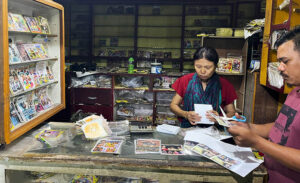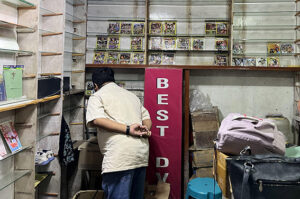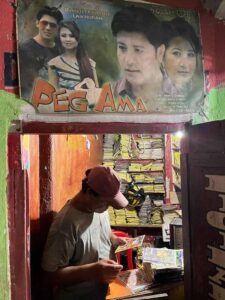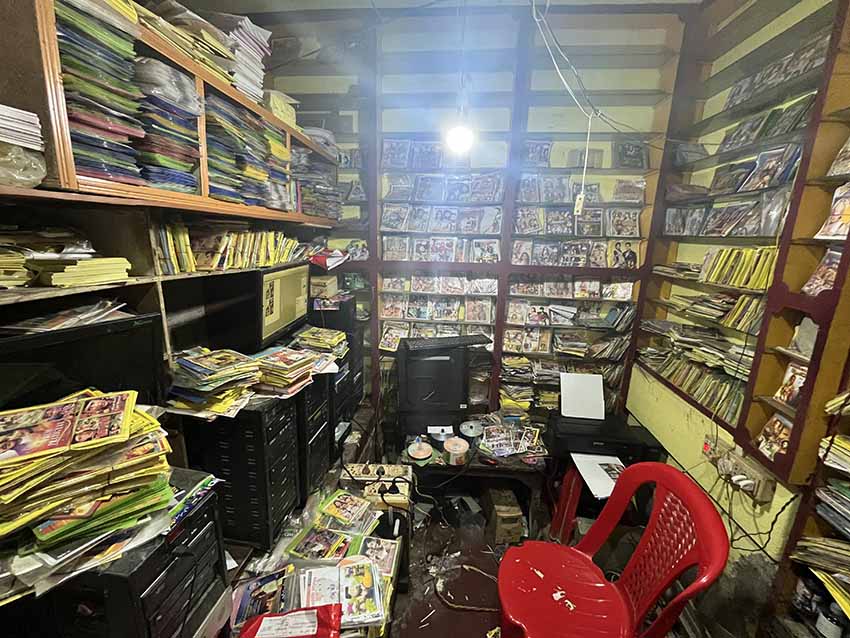Since the inaugural first full-length feature film from Manipur, Matamgi Manipur of 1972, the landscape of Manipuri cinema has traversed a remarkable journey. It has evolved from the flickering era of celluloid to the dawn of Video Home System (VHS) tapes, and now into the digital age. Manipuri cinema has not merely entertained; it has woven itself into the cultural fabric, reflecting societal values and sparking social consciousness while preserving the rich tapestry of local narratives and experiences.
In the vibrant days of yesteryears, cinema halls buzzed with life, each screen a window to a new world. Alongside these grand establishments, small video parlors sprang up like modern-day hearths, accommodating 30 to 50 patrons, becoming intimate venues for cinematic escapades. These humble video parlors, along with the larger cinema halls, became beacons of entertainment, illuminating the lives of many.
Yet, the passion for cinema reached beyond these walls. Films were carried to the most remote corners through charity shows—an ode to community spirit. Parks, open fields, and any feasible space became makeshift theaters where stories were shared and tickets sold, often to fund noble causes or simply to bring joy to those who would otherwise remain spectators to the world of film.
Today, however, the scene has changed dramatically. Once-bustling cinema halls have given way to shopping malls, and the producers’ gaze has shifted to other ventures. The economic strain—rising bus fares, the cost of transportation, and other financial pressures—has led many to shutter their cinema halls. The communal tradition of hiring jeeps and buses to attend screenings has dwindled, as lifestyles and preferences evolve.
Yet, amid this transformation, a glimmer of renewal has emerged. The iconic Shankar Talkies, once a symbol of cinematic vitality, has been reborn as Tanthapolis, now echoing the grandeur of PVR Cinemas with a repertoire of Hollywood blockbusters and new Manipuri features. Kumecs Cinema, another cherished name, continues to captivate audiences with its range of shows and modern amenities. In this half-century odyssey of Manipuri cinema, countless actors, directors, cinematographers, and makeup artists have risen to prominence. Their contributions have not only shaped the industry but also illuminated the cultural and artistic spirit of Manipur, marking a legacy of innovation and passion that endures through the changing tides of time.

In the rich tapestry of Manipuri cinema’s evolution, the unsung heroes of VHS rentals, CD, and DVD sales have played a crucial yet often overlooked role. For decades, these individuals have been the gatekeepers of home entertainment, offering families and communities a chance to experience films within the comfort of their own homes. This shift from communal cinema halls to personal television screens was more than a mere change in viewing habits; it represented a democratization of access, allowing a wider audience to enjoy the cinematic arts.
As cinema halls thrived, the burgeoning market for DVDs and VHS tapes coexisted, catering to a growing demand for home viewing. The rise of this market was meteoric, fueled by an influx of DVDs from Myanmar and the proliferation of DVD stockists and retailers in bustling commercial hubs like Paona Bazar and Governor Road. Here, amidst the crowded aisles and vibrant exchanges, thousands of DVDs found their way into the hands of eager viewers, from Manipur to Assam and even Delhi, where the Manipuri diaspora sought a slice of their cultural heritage.
Yet, the tides of change have not been kind. Today, the once-flourishing DVD market has dwindled to a mere fraction of its former self. In Paona Bazar, only three DVD stockists remain: SOM VCD, Chin Films, and Best DVD. The glory days of a vast network of stockists—Shiva, Pictonest, Polo Vision, ISKDEN, G20, G5, Diamond Video, Star Video, Pooja VCD, Hayum Video, and Anjinao Films, Super VCD, Silky Video, HB Video—are now memories, overshadowed by the relentless march of time and technology.
Among the survivors, Chin Films holds a special place in the annals of this story. Founded by the venerable Kh. Nipen from Malom in Imphal West district, Chin Films was more than just a business; it was a symbol of dedication to the film industry. Tragically, Nipen passed away due to illness during the COVID-19 pandemic, a profound loss that resonates deeply within the community. The contributions of these DVD sellers, though sometimes overlooked, have been vital in making the magic of film a part of everyday life, bridging the gap between the grandeur of the cinema hall and the intimacy of home viewing.
At the bustling Gourahari Market in Paona Bazar, Chitralekha, now at the helm of Chin Films, quietly arranges a modest selection of Manipuri DVDs. As she speaks with the Imphal Review of Arts and Politics (IRAP), her demeanor reflects the weight of recent challenges. The vibrant energy that once defined her business seems diminished, a stark contrast to the days when her late husband, Kh. Nipen was actively involved.
Chitralekha reflects on the current state of the shop, her voice tinged with melancholy. “The business isn’t what it used to be since my husband passed away. DVD sales have plummeted, and I’m contemplating closing the shop like many others have. I haven’t yet decided what I would do next,” she confides, her gaze shifting to the stack of DVDs as she trims their cover pictures with a pair of scissors. “We pay 10,000 rupees for rent each month, and today, I sell DVDs for just 100 rupees. It’s disheartening. I’m thinking of shutting the shop for the day and going home. I’m unsure of the future of this business.”
Chitralekha’s voice softens as she reminisces about their past achievements. “Besides selling DVDs, we used to produce Manipuri feature films. Many of our films received awards and accolades. I still have a deep desire to continue making films. We had several projects in pre-production and production stages, but everything has come to a halt. We’ve lost a substantial amount of money. While there are people in the industry who are genuine and dedicated, others have taken advantage of us. We’ve put in our utmost effort to keep this business afloat. The recent floods have also destroyed many of our discs.”
In the narrow, bustling alley between Governor Road and Paona International Market, Best DVD stands as a fragile relic of a bygone era. Its proprietor, Jeevan Leishangthem, hails Konung Mamang. The store’s façade, modest yet resolute, tells a story of adaptation and resilience. Inside, the right side and back side of the shop still displays an array of Manipuri DVDs, their spines lined like sentinels of a past era. Yet, to the left, a profound transformation has taken place: shelves once brimming with cinematic treasures are now festooned with invitation and greeting cards—a poignant symbol of Jeevan’s attempt to navigate the decline of physical media.

Jeevan reflects on his journey with a mixture of wistfulness and resolve. “I embarked on this venture some seven years ago,” he begins. “Now, only three Manipuri film stockists remain, and our numbers are dwindling. The primary cause of this decline?” His voice falters slightly as he considers the answer. “It is the relentless advance of digital technology. People have gravitated towards online streaming and pen drives, leaving the market for physical DVDs in sharp decline.”
A wistful pause envelops him as he continues, “Perhaps you recall the once-thriving DVD stores in Majorkhul in Thangal Bazar—now, those vibrant establishments are but memories. We are contemplating closing our doors, though the exact moment remains uncertain. The future is opaque, and we find ourselves grappling with the daunting question: What business can we turn to, to sustain our livelihoods?”
The final beacon of the once-thriving Manipuri film DVD stockists is SOM VCD, nestled adjacent to the beleaguered Chin Films. Som, a 40-year-old from Hiyangthang, embarked on his entrepreneurial journey in 2013, a venture that now stands as a poignant testament to an era fading into obscurity. Speaking with the Imphal Review of Arts and Politics (IRAP), Som attributes the inception of his business to the benevolence of RK Devajit of Pooja VCD. “I owe the start of my business to RK Devajit,” he reflects, a trace of reverence in his voice. “He provided me with a shop and unwavering support, allowing me to begin my stockist journey with the film ‘Angamba.’”
In those earlier days, Som’s shop was a bustling hub of activity, its shelves laden with DVDs and its counters ringing with transactions. He was able to meet the demands of a thriving market, affording the rent and maintaining a vibrant presence. However, the winds of change have blown harshly, and the shop that once echoed with commerce has now been reduced to a cramped space, no more than 3.5 feet in breadth and around 6 feet in length. The transition to this small room, where all his remaining DVDs are now stored, symbolizes the stark decline in his fortunes.
Som recounts the heights of his success with a wistful tone. “At my peak, I sold 150 boxes of the Thabaton film, each box containing 600 DVDs. Now, there are days when I cannot sell even a single DVD. When I first began, there were approximately 50,000 DVD sellers across the state, each able to sustain their households from the profits.” His narrative is a poignant reminder of a golden age now rendered distant by the relentless march of technology and changing consumer preferences.

When probed about the reasons behind this drastic downturn, Som attributes it to a convergence of disruptive forces. “The rise of OTT platforms, coupled with the COVID-19 pandemic, has been catastrophic. The convenience of streaming services was inevitable—people desired the freedom to watch films anywhere, anytime, on their smartphones. Yet, we could not have foreseen the rapid decimation of the DVD market.”
He further elucidates the devastating impact of these changes. “Before the pandemic, there was a proposal to launch an OTT platform among stockists, but we were unprepared and ultimately decided against it. Then COVID-19 struck abruptly, forcing us to shutter our shops for extended periods. With people confined to their homes, they turned to OTT platforms like the Mobile Film Distribution Center. As our business faltered, these platforms flourished. The cost of Manipuri films, which was around 5 lakhs before COVID-19, fell dramatically during the waves of the pandemic. And then, around 15 months ago, the ongoing conflict between communities in Manipur began, sealing the fate of nearly all remaining DVD stockists.”
Som’s lament extends beyond his own business, reflecting a broader crisis. “The internet and mobile applications have not only ravaged the DVD market but have also impacted other retail sectors. People now purchase clothes and various items online. While the situation may differ from the DVD market, the decline in selling capacity is evident across all sectors. It is a reality we must accept.”
In the midst of this upheaval, some OTT platforms like MFDC, Epom Media, and MeSo TV have managed to thrive, their YouTube channels providing a new avenue for film distribution.
Som’s current reality is stark and disheartening. “I haven’t made a profit in the last two years, not even enough to cover the rent of my shop. I anticipate closing it within a year. My only reason for keeping it open is my emotional attachment to it. I have no plans for another business and am uncertain about my future. Should I close, numerous other retailers, numbering around 20 in various districts and Imphal, would face the same fate. But, alas, we are left with no choice.”
As the digital era continues its relentless march, the landscape for individual DVD stockists in Manipur has become increasingly bleak. Once cherished hubs for film enthusiasts, many of these dedicated individuals have either transformed their businesses into new ventures or closed their doors permanently. The shelves that once proudly displayed Manipuri film DVDs now host an array of alternative goods—smartphone covers, chargers, invitation cards, and other miscellaneous items. This transition reflects a larger, unavoidable shift in consumer behavior and technological advancement.
The remaining three DVD stockists, each a testament to a personal passion for sharing and celebrating Manipuri cinema, now face a precarious future. The rise of OTT platforms such as Netflix, Amazon Prime Video, and MUBI has redefined how people access and enjoy films, often making physical media seem redundant. These platforms offer the convenience of on-demand viewing, a stark contrast to the days when these stockists played a crucial role in spreading the magic of Manipuri cinema.
The contributions of these individuals have been invaluable; they have not only made films accessible but have fostered a community of viewers who cherish and engage with Manipuri culture. Yet, as technology continues to evolve, their future remains uncertain. The passionate efforts of these DVD stockists to share films with their communities are now overshadowed by the digital revolution.
The soul-stirring reality is that the final three stockists, despite their deep commitment and personal investment, may soon become a nostalgic memory. Their struggle reflects a broader shift in how films are consumed and shared, highlighting the transient nature of their once-vital role. The uncertainty of their future leaves a lingering sense of both loss and admiration for the enduring love they have shown for Manipuri cinema. As the digital age unfolds, the personal stories and sacrifices of these dedicated individuals stand as a testament to a time when the magic of cinema was shared through the tangible, cherished medium of DVDs. As digital technology advances, the way forward is clear: the convenience of streaming platforms and online access continues to reshape viewing habits, offering unprecedented flexibility and choice. While this shift poses challenges for traditional DVD stockists, it also heralds new opportunities for adaptation, as embracing digital solutions can lead to innovative ways of connecting audiences with the rich tapestry of Manipuri cinema.













3 thoughts on “The Last Three Manipuri Films DVD Stockists: Embracing the End with Poignant Goodbyes in a Digital Age”
Always learn something from you. Thanks for info!!
The balanced perspective you offered between the sentimental value of physical media and the practicality of digital streaming was both refreshing and well-articulated. Excellent write up 👍
This is a great story I would like to thank the writer for paying attention on the issues of dvd sellers…
Comments are closed.